Matthew 25:35-40
[Jesus said] ‘For I was hungry and you gave me food, I was thirsty and you gave me something to drink, I was a stranger and you welcomed me, I was naked and you gave me clothing, I was sick and you took care of me, I was in prison and you visited me.’ Then the righteous will answer him, ‘Lord when was it that we saw you hungry and gave you food, or thirsty and gave you something to drink? And when was it that we saw you a stranger and welcomed you, or naked and gave you clothing? And when was it that we saw you sick or in prison and visited you?’ And the king will answer them, ‘ Truly I tell you, just as you did it to one of the least of these who are members of my family, you did it to me.’
Room in the Inn
If Mary and Joseph showed up on the steps of an inn in Palestine today, they would’ve had a bed, some coffee, and probably three servings of a home cooked meal. At least, this is what my YAGM (ELCA Young Adults in Global Mission) program cohort (a group of young adults who serve in one country together) and I decided about one month into our year of service there. I felt like I was walking into my grandma’s house every time I stepped into a Palestinian home. I was greeted automatically with a kiss on the cheek that was quickly followed by Arabic coffee, sweets, and eventually an invitation to lunch or dinner.
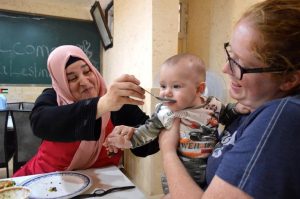
Sharing a meal in Aida Refugee Camp in Palestine
It didn’t matter who I was or what was happening in the world around us. I was always welcomed in with joy. In this way, Palestinian hospitality was an example of God’s radical love. This fact was made clear to me one rainy, Sunday afternoon.
Holy Water
I was invited to another volunteer’s host family for a big lunch. When we got there, we discovered that even though rain was falling all around us, there was no more water in their water tank. In the West Bank, one way you can tell the difference between a Palestinian home and an illegal Israeli settlement is to look at the roofs. Palestinian homes will have a water tank on top of them. If this tank runs dry, families could be out of water for weeks. Meanwhile, illegal settlements have access to unlimited water piped from reserves found in Palestine.
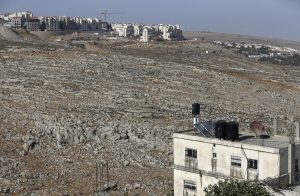
Upper left: Israeli settlement supplied with plenty of water
Lower right: Palestinian home reliant on rooftop water tanks due to Israeli control of water supply
In the midst of these forces of occupation, Palestinians still show love through their hospitality. When I found out that Sunday that our hosts did not have water, I was ready to call it a day, to walk back home in the rain or make something simple instead. However, our Palestinian hosts were determined to have the lunch they planned for themselves and their guests. We took turns carrying in buckets from the garden cistern, boiling it in a tea kettle so we could drink it or use it to make rice. Then after our collective efforts, we sat down to a big, delicious meal. It was moments like these that felt most holy to me.
Unconditional Love
During my year as a volunteer with ELCA Young Adults in Global Mission in Palestine, I felt God’s unconditional love through the hospitality of my Palestinian friends and family. It was in the big hug my host aunt always gave me as I walked in the door. It was there in the third helping of stuffed grape leaves that my host grandma piled on to my plate, ignoring my protests that I was too full to eat another bite.
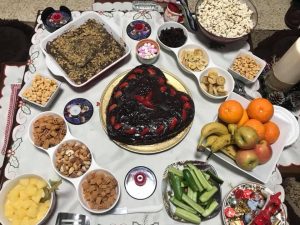
Surprise birthday meal made for me by my Palestinian host family!
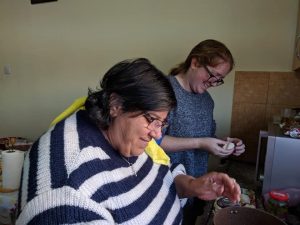
Learning how to cook with Teta Rose
When I felt this love from Palestinian families, it challenged me to take a hard look at my own life. How do I welcome others unconditionally, and not just when it’s most convenient for me? Just as I see hospitality as God’s love, I also understand it to be a call to action. Calling us to take a look at our churches and think who would feel that radical welcome as soon as they walked in the door or joined the Zoom chat. My Palestinian hosts gave me a greater understanding of hospitality. The understanding of how a welcoming smile or a shared meal is a holy act spreading God’s love to all. The kind of love that isn’t conditional to where and when it works best for me. Love that envelops a stranger the same as an old friend.
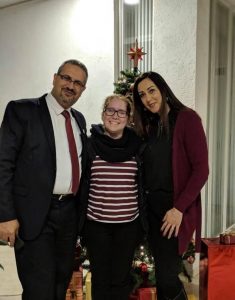
Celebrating Christmas in Palestine with my host family
For me, Advent is the perfect time to put their example into action in my own life. Advent, much like a host preparing for visitors, is about the preparation for the birth of Jesus. This year hospitality will have to look different in the midst of a global pandemic. However, it also provides an opportunity to break from our normal routines and to do what the scripture above asks of us. An opportunity to reach out to the stranger and share the radical love and hospitality that all people deserve.
Reflection Questions
- What is one way you – like Katie’s Palestinian neighbors – might welcome others unconditionally, and not just when it’s most convenient?
- Who in your community is being told they are not welcome? Your neighborhood? Your church? Your country? How do you understand God’s call to respond?
- What was a time you received the kind of care we hear Jesus talk about in Matthew 25 / Katie talked about receiving in Palestine? What did you learn about God in that experience?
- In the midst of advent in a pandemic, what are some creative ways we can still offer hospitality (to friends, neighbors, strangers, at church, in the public square)?
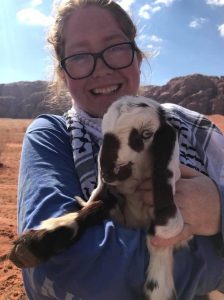
Katie Evans (she/her) served as an ELCA Young Adult in Global Mission in Jerusalem/West Bank from 2018-2019. While there, she taught English at Dar Al Kalima Lutheran School in Bethlehem. Since returning, she worked with Lutheran Campus Ministry at the University of Maryland, and she is currently an administrative assistant in the Metro D.C. Synod Office. Katie is a member of Hope Lutheran Church in College Park, MD.
To learn more about the ELCA Young Adults in Global Mission program click here
To learn more about the Lutheran Schools of the Evangelical Lutheran Church of Jordan and the Holy Land (including the school where Katie worked in Palestine), check out the work of Opportunity Palestine here
